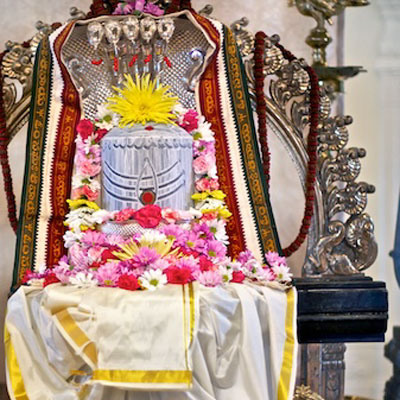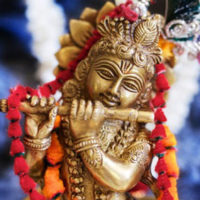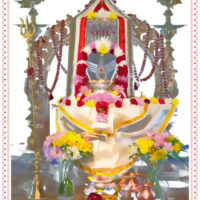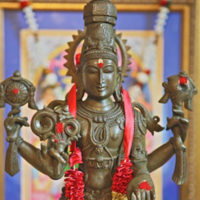Description
Note: All ceremonies are free to attend.
Contributions are optional, and help cover Temple expenses.
Panditji reads contributors’ names as part of the ceremony.
Learn more about contributions.
Rudrabhishekam: 10:00 AM – 3:00 PM
Great Night Rudrabhishekam/Annabhishekam: 11:00 PM – 2:00 AM
Shiva has thousands of names, each describing his greatness. “Shiva” means auspicious. Shiva, the God that destroys evil, is the third among the Divine Trinity (Brahma, Vishnu, Shiva). As Shankara, he is the giver of happiness to all.
The Linga is a symbol of the formless universal Consciousness of Lord Shiva. It also represents the potential unmanifest elements of the relative world. The Yoni, upon which the Linga sits, is a symbol of Shakthi and represents manifest universal energy. From the unmanifest comes the manifest energy, through which all things are created. The Yoni and the Linga symbolize the communion of eternal Consciousness and dynamic power of Shakthi, the source of all actions and changes, the creative power in the universe. They symbolize the unity of life and supreme energy.
Rudrabhishekam, 10:00 AM – 3:00 PM:
In this Puja, Lord Shiva is worshipped in his Rudra form. It is hailed in all Vedic scriptures as one of the greatest Pujas to remove all evils, to attain all desires, and for all around prosperity. This Puja is particularly performed for the sake of washing away one’s sins and afflictions. It brings peace, prosperity, happiness, and family togetherness. Performing this Puja for Lord Shiva is an excellent remedy for anything not in harmony with Nature (doshas) and for all-around success in all areas of life.
According to the Puranas (ancient spiritual texts), after creation was complete, Parvathi asked Lord Shiva which rituals pleased him the most. Lord Shiva mentioned the Vedic month of Maagha, the day of Krishna Chaturdasi (day before no-moon day), when the people performed Rudrabhishekam (holy bath) while chanting the mantras “Om namah Shivaya” and “Hara hara Maha Deva.” According to the Puranas, from that day onward, people performed Rudrabhishekam throughout the great night while chanting the mantras.
This is a very special and exceptional worship. It is well-known that Lord Shiva is a love of ablutions (abhishekapriya). Since the Shiva Lingam is considered the symbol of Lord Shiva and Shakthi, formal worship on Mahashivarathri consists of bathing the Shiva Lingam. Lord Shiva is said to be burning with Hala Hal (poison), so only those items with a cooling effect are offered to him. A cool water bath is believed to propitiate him best. There is a belief among devotees that participation in this Mahashivarathri Abhishekam and offering holy worship will lead to blessings with prosperity and a peaceful life.
Bathing the Shiva Lingam as a part of the Shiva Puja symbolizes the removal of impurities from our mind. It also means washing off false ego. Unless we attain self-realization, we all become the victims of a false-self or ego. False-self is due to illusion, covering up our real soul and affecting our mind which then acts from mistaken identity. According to Vedanta, the philosophy based on the Vedas, this false-self concealing our real self is the root cause of our bondage and suffering in life. This purification also symbolizes, at the philosophical level, the eradication of our accumulated material interests that often blur the inherent spiritual core or reality.
During Mahashivarathri, the pandit will chant the Mahamrithyunjaya mantra. The brief meaning of Mahamrithyunjaya mantra is: We invoke Lord Shiva and pray, O three-eyed one (Lord Shiva), we worship you, the one of sublime fragrance who is the source of all vitality, growth, and splendor. We are just a ripe cucumber plucked from its vine. May we transcend death and gain immortality.
Great night Rudrabhishekam/Annabhishekam, 11:00 PM – 2:00 AM
On Mahashivarathri, at sunset time (pradosham), devotees show their devotion by performing the marriage ceremony of Lord Shiva and Parvathi (Shakthi). After that, the union form of Lord Shiva and Parvathi in the form of a linga and yoni will be worshipped by means of the Abhishekam. It is a special Abhishekam with many ingredients such as water, milk, honey, sugar, ghee, fruit juices, bilwa leaves, and specially cooked rice (annabhishekam). This ceremony provides food for all beings in the universe. Anyone attending this Annabhishekam will never go hungry. It is profoundly purifying, washing away layers of karma.
This is the most powerful Shiva night of the year. Join us!



